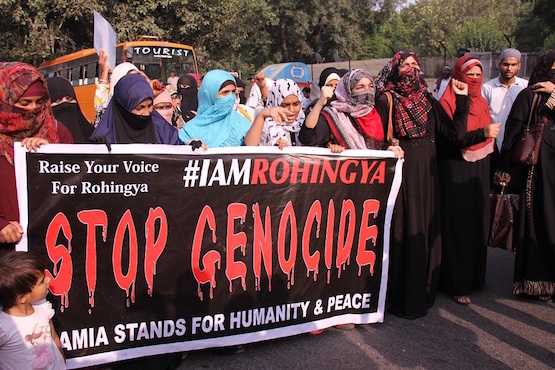
Indian Muslims in New Delhi Sept. 13 express solidarity with Rohingya refugees of Myanmar. They demanded that the Indian government help Rohingya refugees. (ucanews.com photo)
Hundreds of people shouted slogans and waved placards on the streets of New Delhi as Muslim groups intensified protests in support of Rohingya refugees facing deportation from India amid a fresh wave of violence in Myanmar.
Protesters in New Delhi Sept. 13 marched toward the Myanmar embassy expressing solidarity with Rohingya Muslims who fled their homes because of sectarian violence in the Buddhist-majority country.
Authorities banned gatherings near the embassy fearing crowd violence.
Protests intensified after Federal Home Affairs Minister Rajnath Singh, at the end a four-day visit to India's Muslim-majority Jammu and Kashmir state, affirmed deferral of a deportation plan but did not say it would not proceed.
"We will act tough against illegal immigrants and our stand will not be lenient at all," Singh said in a press conference on Sept. 13 in Jammu.
Watch this ucanews.com video about the protest in New Delhi.
There have been Indian government claims that Rohingya constitute an internal security threat because of a long-running Islamic secessionist movement in Jammu and Kashmir.
An estimated 400,000 ethnic Rohingya Muslims have fled the strife-torn Rakhine State in Myanmar, mainly to Bangladesh, since violence and discriminatory treatment increased in 2012.
A new wave of violence began in August after Rohingya militants attacked some police and military posts.
Muslims have been protesting since last month when the pro-Hindu government of Prime Minister Narendra Modi announced a plan to deport some 40,000 Rohingya people across India, settled mostly in the cities of Mumbai, New Delhi and Hyderabad as well as in Jammu-Kashmir State.
Jammu and Kashmir alone has some 13,700 Rohingya Muslims, state government data shows, with their population increasing by more than 6,000 between 2008 and 2016.
Protesters complained that the deportation plan came despite the growing displacement of Rohingya in Myanmar.
Khalid Saifi, a member of Muslims United Against Hate, which was part of the New Delhi protest, said: "It is strange that the world is silent about such genocide in Myanmar."
Apporanand Jha, a professor at Delhi University who was also part of the protest, said Myanmar state counsellor Aung San Suu Kyi had failed to rise above Buddhist sectarianism.

A Muslim man holds a poster asking for the government to end its silence on the Rohingya crisis in New Delhi Sept. 13. (ucanews.com photo)
"It is saddening that powerful states have not come out in support of a weak community which is being battered," he told ucanews.com.
The government in New Delhi, led by the Bharatiya Janata Party (BJP), has stated that refugee identity cards issued to Rohingya in India by the United Nations High Commissioner for Refugees are irrelevant.
Modi, who visited Myanmar last week, expressed concern over "extremist violence" in Rakhine, but did not say anything about the suffering of ordinary Rohingya Muslims.
Raees Ahmed Ansari, a member of the Islamic political organization Jammat-e-Islami, told ucanews.com that Rohingya Muslims in India are "our brothers."
"We are pained to see their situation and appeal to the Indian government to let them stay here," he said.
"We want to help them financially and their children to get a good education."
Church officials in Jammu and Kashmir state have also expressed concern over the deportation plan.
Father John Paul, of the Jammu-Srinagar Diocese, told ucanews.com that the issue of migrants should be dealt with in a humanitarian way.
"There are so many Christian countries which are providing asylum to refugees from the Middle East," Father Paul said.
Meanwhile Zakir Musa, leader of a newly formed Al-Qaeda cell in Kashmir, last week threatened violent action if Rohingyas are deported.
"They (Rohingya) and we warn the government of India of dire consequences if it deports them from here," Musa said in a 10-minute audiotape circulated on social media.


